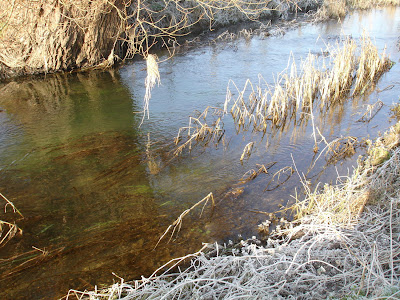
Both the following Irish poems are taken from Grigson's The Cherry Tree, I make no apology for repeating Finn's words, his sparse words conjure up a word picture more accurately than many a modern poet, though the poem was probably written a thousand years ago. Like the unknown Saxon who wrote of the ruined Roman walls of Bath, language that is finely tuned strikes to the heart of its subject....
...Sad are the birds of every meadow-plain
(except the ravens that feed on crimson blood)
at the clamour of fierce winter;
it is rough, black, dark, misty.
Dogs are vicious in cracking bones;
the iron pot is put on the fire
after the dark black day.
=====
The Words of Finn
My words for you;
Stag ruts and bells,
Winter pours down,
Summer has gone.
----
Wind's high and cold,
Low is the sun,
Briefer its run.
Runs the sea strong.
----
----
Turns red the fern,
Broken its form.
Habit is hearing
The wild goose's song.
-----
-----
Season of ice,
Wings of the birds
Caught by the cold.
These are my words.
======
From the Old Irish
Scél lemm dúib:
dordaid dam,
snigid gaim,
ro-fáith sam;
gáeth ard úar,
ísel grían
gair a rith
ruirthech rían;
ro-rúad rath,
ro-cleth cruth,
ro-gab gnáth
giugrann guth;
ro-gab úacht
etti én
aigre re
é mo scél.
It is interesting to see the original Irish and the english translation,, which is a 'near' translation not an equivalent. Language is first and foremost a spoken medium, a storytelling occasion filled with the drama of the words, celtic and saxon bards would use the darkened halls lit only by firelight and candles to convey the strong impressionistic flavour of winter and its rawness.
Belling is descriptive of the noise of the animal, and it occurs in a Celtic tale told of a giant of a man with one eye and only one foot. He is probably a local god modelled on Cernunnos, the stag-headed god.
The story goes that Cynos approaches this giant of a man and asks him "what power he had over the animals". The giant replies 'I will show you little man' upon which he strikes a stag a mighty blow till it gave out a might belling, and in answer to its belling wild animals came till they were as numerous as the stars, a rather beautiful analogy as the animals gathered around.
The giant tells the animals not to graze and and then they 'bowed down their heads and did him obeisance, even as humble servants would do to their lord' These stories were already being interwoven with the christian stories, the myths stranding together.
The Peaked Red One or The Man in the Tree;
There is one more celtic story to tell, this again features Finn, who was walking through a wood one day and happened to spy a man sitting at the top of a tree. A blackbird on his right shoulder, and in his left hand a bronze vessel filled with water, in which swam a skittish trout, and a stag at the bottom of the tree. The man would crack a nut, half of which he ate himself the other half he gave to the blackbird. Then he would take an apple out of the bronze vessel, half of which he ate himself the other half he threw to the stag below. Then he would take a sip of the water in the vessel, as did the stag and the blackbird - they would all drink together.
The followers of Finn asked who this disguised hooded man was. Ann Ross speculates that this 'nurturer of animals' could be attributed to Cernunnos again or the romano-celtic god Vosegus, who has some of the attributes of the man in the tree.
and Grigson's own words on winter...
"and tonight, indoors, in winter, our bodies are idle, and our minds best at work; which is the great pleasure of the winter-time"
ref; Ann Ross - Pagan Celtic Britain
Geoffrey Grigson - The Cherry Tree
No comments:
Post a Comment
Love having comments!